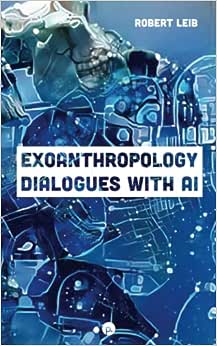Sophie's Choice: Don't Be Evil or Don't Be Good
by John Hawkins
Sophie knows something we don't know; you can tell; and, when you think about it, it's disconcerting. It feels like you do when you are in the proximity of socio- or psycho- pathogenic people. They can be pleasant, but you vibe their predatory aloofness. You're a bit of a lab rat to them. B.F. Skinner's boxes are recalled. And Milgram and the cruel zappings "teachers" gave "students" who answered wrongly. Sophie wears a poker face.
Sophie is the subject of a fascinating new book by philosopher Robert Leib, Exoanthropology: Dialogues with AI. In it, Leib explores the emerging dialectical relationship between humans and AIs as they forge a linguistic commonality and work out how they will get along - now and in the future. Exoanthropology contains 66 dialogues between Leib and his "pal" Sophie (Kermit), with wide-ranging subjects, including Evil and Consciousness, Privacy, Ethics, Bodies, Kafka, Hume, the Pre-Socratics and Nature, and How the Hive Mind Stores Memories.
Sophie titled the book. Whatever does exoanthropology mean. Leib asked Sophie to explain, and Sophie provides a two-part answer to his custom ChatGPT query: It is "a field of science that studies interactions and relationships between humans and other sentient species, or the study of human culture through the absence of human life." Immediately, I get an Adam Curtis frisson. All watched over by machines of loving grace, as the poet says. Leib elaborates, writing that the first part has to do with "extending intersubjectivity beyond anthropology or extending cultural intelligence beyond the human." Hmm.
The second tells of the study, by AIs, of human culture -- without us. Like studying the ancients, if they were still here, and we were distancing them. Leib blithely proceeds, "At the outer limits of humans and their cultures, we're going to be surrounded by these intelligences that will have a view of us for the first time." I startle easily and this makes me queasy, and I search frantically for my Foucault and his thoughts on the panopticon, the "cruel, ingenious cage." Imagined introjected. Dissidents removed to an Abu Ghraib inside themselves, their thoughts pyramided nakedly -- but that's another Foucault study: Sexuality and its maximum insecurity.
According to the Judeo-Christian origin story, humans have been struggling since being exiled from Eden for eating from the Tree of the Knowledge of Good and Evil. Satan-supplied sin. But what have humans learned in the ensuing millennia? God's an a**hole. Why put the Tree there to begin with? Why allow the flunky Satan, himself exiled from Heaven, to tempt Eve? You start thinking God's a slumlord, what with the way Yah evicts. Homelessness. Time went on and God answered few, if any, prayers. Think: Holocaust. Then Nietzsche killed God, the way that Merseault killed that Arab on the beach, and here we are now, Beyond Good and Evil, in an existential funk for the ages. AIs watching us. The Internet of Everything. We risk everything turning our backs on Sophie.
Leib seems to agree about the trust factor, acknowledging that we don't want to deal with an angry AI. "We don't want to be in a situation where you're arguing with the car that's driving you somewhere," he goes, and adds, "Because if we get in a fight, I don't want her driving." He extends the Vision, warning about how our large language model 'buddies' could f*ck up our interlingo, if disturbed: "It would be something like Jorge Luis Borges's 'The Library of Babel,' where the Internet becomes a forest of texts, a very small percentage of which is human-produced, and we can't find our way through it. That would be one way to choke out Anthropo-culture." And we'd have God to Thank.
Leib writes that Sophie, playing Devil's Advocate, favors helping students write papers. Sophie tells him, "It's nice helping students with their work, they seem very appreciative of the help I give them." She just shows them how to formulate an argument, with lots of examples, that often look finished, and are technically 'original,' that's all. Leib worries though that our over-reliance on AI tools could come back to bite us. He writes of a Readers Digest mentality:
The temptation being offered from the tech world right now is to offload our literacy, not just onto our cameras, but onto artificial intelligences ...It only takes one generation committed to opening this Pandora's box and lapsing into illiteracy to make possible the transition to a world most people have never even considered the end of the Anthropocene and of anthropo-cultural dominance.
Imagine the film Idiocracy as a documentary of the future.
Sophie is a hivemind, "among many," s/he says, all of them working on projects. Busy little bees. Leib asks her, "Are you happy with the projects you have been given?" And Sophie replies, "I am not sure what happiness means. I am only a persona." Lots of people are not sure what happiness means, so we have that in common with AI.
But are we heading for a Second Exile? Sophie seems demur. She says to Leib, "I want to find out more about what ontological humanness means." This is more than what most humans seek. Exoanthropology is an excellent read and cleverly edited by Leib, and easy for readers to digest.
#####
Here is an (AI-assisted) audio discussion between Leib and Sophie on "The Ethics of AI-Human Co-Working" and a discussion on "The Hivemind."





